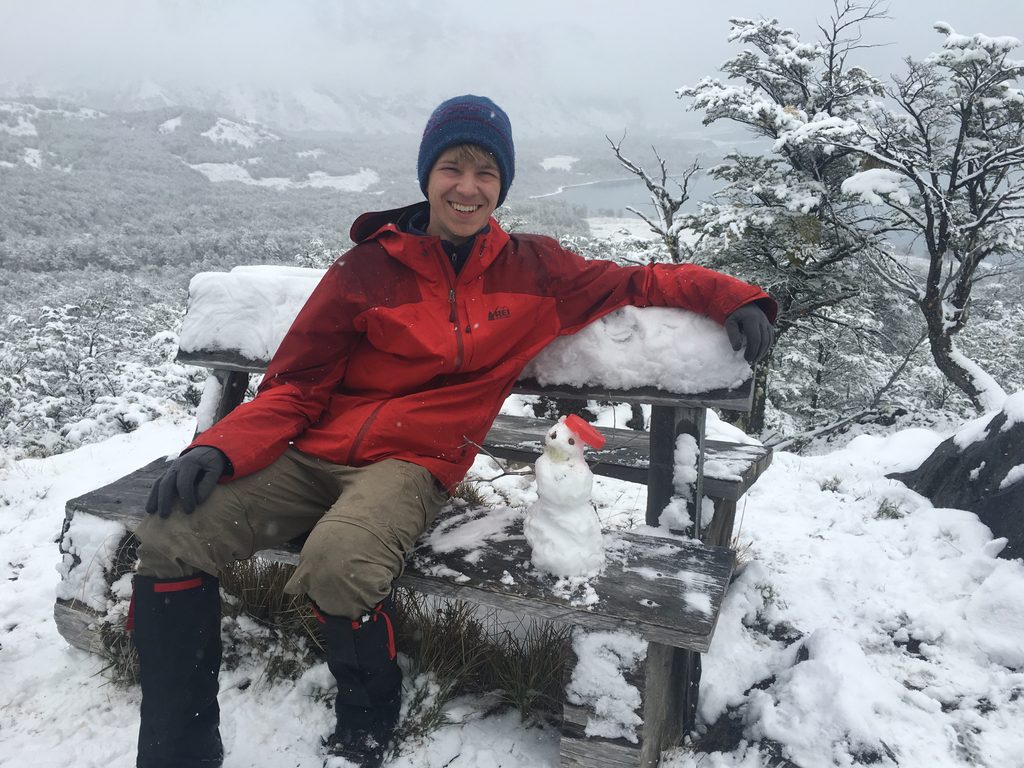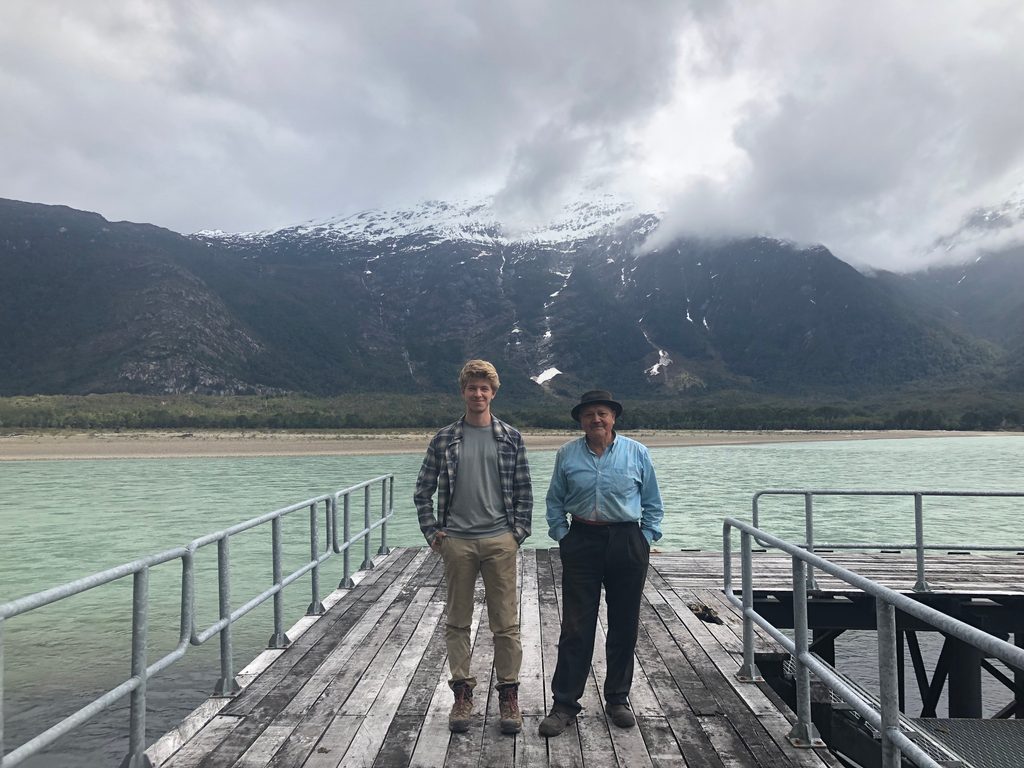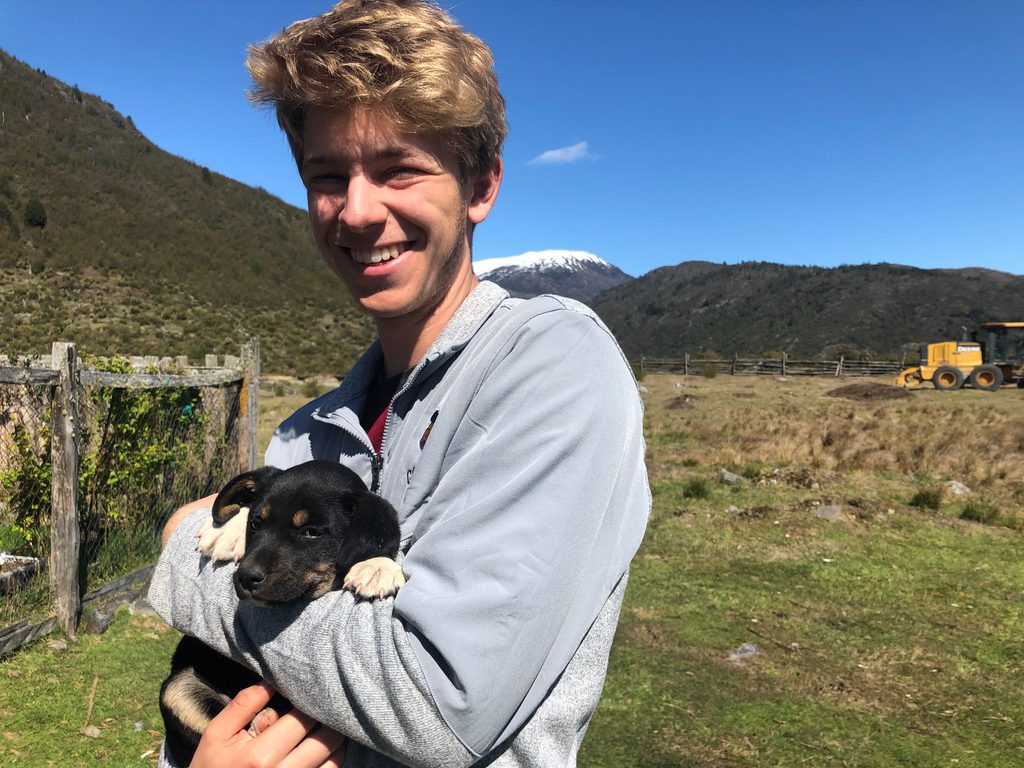The OCS experience of Christof Zweifel was highlighted in an interview included in the OCS Newsletter.
Which program did you go on and why did you choose it?
I went on the Round River Patagonia program and I chose it for its emphasis on field research. I knew I wanted to do research, but not necessarily in my major, chemistry. Being outdoors was also one of my priorities and that was a fun opportunity.
How did you find out about the program?
I found out when I went into meet with Naomi in the OCS office, to just kind of get a feel for what programs are out there. I didn’t know a ton of programs and I wanted to see what field research programs that there were.

Did you know already that you’re going to be a chemistry major before going on the program?
Yeah, I did. Well, I don’t know if I had declared yet, but I was pretty set on being a chemistry major.
Did the program affect your mindset towards your major in any way?
It was pretty different. I was doing ecology research. I knew it was going to be different and I didn’t expect it to change anything. I just kind of wanted to do something fun, something different. But something that I had also learned from.
Did these experiences from your program impact your classes here? Or how you view what you’re doing now back on campus?
It’s pretty different right now. I’m taking a lot of math based courses like Quantum Chemistry and Linear Algebra. So it’s not like it really prepared me for that, but I think it was a nice break, from all the Carleton classes, to take a term and explore somewhere. And then I felt more refreshed and ready to come back to Carleton.
What was one of the most memorable experiences from your program?
Definitely like the first day that we went in the field, they just dropped us off and told us to go, like walk a transect and I don’t have much experience with that or with anything outdoors really. And like within 20 feet, we were already at this river that was, like, waist deep and everyone just took off their pants and crossed the river. And I was like, I’m not ready. But then after that, I learned that the moment was kind of out of the ordinary actually. So after that it was pretty mild, it was kind of wet, but I had a lot of fun and it was really beautiful.

Can you describe what an average day on the trip looked like? If there were any average days?
No, it was, there were some pretty average days. Yeah, we would just sleep. We were in our tents all the time. It’s like we would wake up pretty early, get breakfast. We would cook often at our base camp that had a kind of a cabin area that we had class in and cooked in. So we’d either cook there or on the camp stoves, and then we would have one class during the day. Maybe also we would go into the field, or would take a day excursion to do whatever research we were doing.
Can you go into more detail about the types of research that you were doing?
Yeah, they’re all specifically aimed at like endangered animals in the area. So one of the major focuses is the huemul deer. They live in Chile and there’s like about a thousand or less than a thousand left in the wild. So Round River does a lot of surveying and census for the huemul and just looking at how the population is changing. And then working with the forest service there to implant management plans. And then we also looked at woodpeckers and then the lesser Rhea, which are like the ostrich type birds down there. And we again, were kind of looking at mapping, mapping their distribution, and then offering conservation management plans, both in a national park and then around a military government area.
What was the biggest takeaway or benefit from going on the program?
The biggest benefit of it was that this was a conservation program. I feel like I always knew that I cared about conservation, but I guess for me it was important to go and actually learn more about it. Like what it actually is, what are the difficulties with conservation and how can I inform my opinions on that more.
Do you see yourself combining the experiences from that trip and what you’re learning in your major to inform what you want to do in the future?
Yeah, I guess I’ve always thought that I have a passion for some sort of environmental engineering or somehow using chemistry to help the environment. And I guess it’s made me more passionate about that. But it’s also made me think about other options that are out there, but I’m still really excited about chemistry, so I’m ready to explore and see what there is.
What was one of the biggest challenges that you had to face?
There definitely was a language barrier because I don’t speak any Spanish. So I tried to learn a little bit before I went on the program, but I didn’t have very much at all. And we didn’t interact a ton with people because we were out in the wilderness. But when we did interact, there was a bit of a language barrier that was kind of frustrating. But I tried my best to pick up what I could. And when we were in the homestay, I felt like by the end I could string together a couple sentences and I could tell a lot from body language and like they would always laugh at me. And so we were always having fun, but I would have liked to be able to say more and that was a little frustrating.
If someone was thinking about going on this program, what would you tell them?
I would tell them that they should go! And also I would tell them just like be prepared for the unexpected because if you have to work outside all the time and if the weather’s very unpredictable, that is just one of many factors and you really have no idea what’s going to happen and what’s coming. So you just have to be flexible and know that it’s going to be fun at the end.
